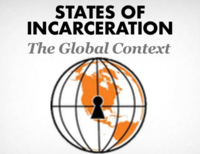New report, Protecting Written Family Communications in Jails: A 50-State Survey, finds how far states go to protect letter writing in jails
As jails around the county experiment with postcard-only policies, our new report examines jail mail standards in each state.
by Alison Walsh, May 19, 2016
As new technologies such as video visitation and electronic messaging are too often introduced as expensive and low-quality substitutes for face-to-face contact in prisons and jails, letter writing would appear to be the most cost-effective and reliable communication option for incarcerated people and their loved ones.
And letters can help incarcerated men and women stay in touch not just with family members, but also with medical caregivers, social service workers, educators, and employers, making reentry less challenging and recidivism less likely. But jails in several states are experimenting with taking away letters and requiring people to communicate via postcards. A new report released today explores the role of state agencies in regulating counterproductive policies like the banning of letters.
The approximately 3,300 jails in the United States operate under a complex system of leadership. When individual jails adopt harmful policies such as letter bans, it becomes important to know which agency is in charge of setting and enforcing best practices in county jails on a statewide level. Corey Frost of Prison Policy Initiative’s Alternative Spring Break program set out to identify the entities that regulate jail standards in every state. He also determined whether each entity’s authority is binding and what restrictions (if any) these entities place on written communication. His new report, Protecting Written Family Communications in Jails: A 50-State Survey, finds that states that acknowledge the importance of written communication are less likely to contain jails that have adopted postcard-only policies.
Frost notes that although jails in 13 states have implemented letter bans, most state agencies prohibit restrictions on the volume or length of letters an incarcerated person can receive or send. In most states, including some of the states where sheriffs have banned letters, “restricting the written communication of incarcerated people to postcards contradicts the spirit, if not the letter, of the guidelines.” His report recommends that governing bodies, from groups with statewide oversight to local sheriffs and jail administrators, set guidelines that recognize the value of written communication, ensure that incarcerated people are allowed to receive and send letters of unlimited length and volume, and permit restrictions to mail service only when warranted by legitimate safety concerns.
Protecting Written Family Communications in Jails: A 50-State Survey, is a follow-up to Prison Policy Initiative’s 2013 report, Return to Sender: Postcard-only Mail Policies in Jails, which described the value of letter correspondence for incarcerated people and detailed the harmful consequences of postcard-only restrictions.



